The yearly observance of the Passover is considered to be the defining event for the Jewish people and the nation of Israel. Passover was such a significant event that the LORD Himself declared that the month in which the Passover occurred would be the chief of months for the Israelites:
Now the LORD said to Moses and Aaron in the land of Egypt, “This month shall be the beginning of months for you; it is to be the first month of the year to you.” – Ex. 12:1-2
The phrase “beginning of months” in Hebrew is “ראש חדשים” – “rosh hosdeshim,” which literally means “the head of months” or as translated above, “the beginning of months.” The LORD declared that the yearly cycle of days, weeks, and months for the nation of Israel would be marked by the first month which is consumed by the preparation and observance of the Passover.
The Passover is the only biblical holiday that has instructions that both precede it and follow it. The Passover lamb was to be chosen on the 10th day of the month and then slaughtered on the 14th day. Passover day began with the slaughtering of the lamb on the 14th of the month and continued into the 15th of the month when the lamb was roasted and eaten (Ex. 12:3-8).
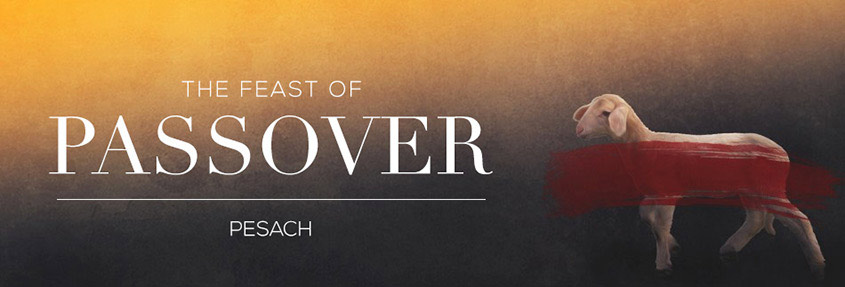
The Practice of Passover
The Passover lamb was to be eaten together with bitter herbs and unleavened bread. The eating of unleavened bread at Passover was to be to the exclusion of eating anything containing leaven to the extent that nothing leavened should even be seen among the people:
For seven days you shall eat unleavened bread, and on the seventh day there shall be a feast to the LORD. Unleavened bread shall be eaten throughout the seven days; and nothing leavened shall be seen among you, nor shall any leaven be seen among you in all your borders. – Ex. 13:6-7
In order to keep this commandment regarding leaven, a thorough house cleaning is undertaken by the Jewish people in the days leading up to Passover.
The week of eating unleavened bread beginning from the day of Passover is also called the Feast of Unleavened Bread (Lev. 23:5), however since these two events overlap with each other, they are often referred to by one name, either Passover or the Feast of Unleavened Bread. Throughout the Bible, in both the Old and New Testaments, we see the interchanging of these festival names.
The First Fruits
During the week-long celebration of Passover there will always be one regular Sabbath day. On the day after the Sabbath during Passover week, God commanded His people to bring a sheaf of grain as a wave offering to the priests, this was considered to be the first fruits of the harvest (Lev. 23:9-14). This day would naturally always fall on a Sunday since it was the day after the Sabbath day.
From this day, the Sunday of Passover week, the Israelites were then to count seven full weeks until the day after the Sabbath of the seventh week when the Israelites were then to present the first fruits of the harvest with two loaves of bread that do contain leaven (Lev. 23:15-21). This biblical holiday is called “שבועות” – “Shavuot” – “Weeks,” and as is commonly known for its English name, “Pentecost,” which originally comes from the Greek. Both the wave offering of the first fruits and the Feast of Weeks are intrinsically tied to the celebration of Passover.
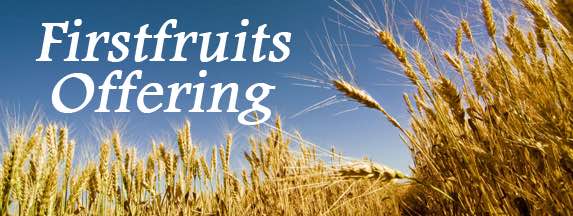
The Month of Aviv
All of the events described above are calculated from the day of Passover, both before and after. Passover had such a defining effect on the Israelites that the LORD declared it to be the beginning of the year for them and that the month itself would be defined by the event of Passover:
Observe the month of Aviv and celebrate the Passover to the LORD your God, for in the month of Aviv the LORD your God brought you out of Egypt by night. – Deut. 16:1
In this verse, the children of Israel are commanded to “Observe the month of Aviv” or in the Hebrew, “שומר את חודש אביב” – “shomer et hodesh Aviv,” which can be literally translated, “Keep the month of Aviv.” The month of Aviv would be defined by the celebration of Passover and the Israelites were commanded to keep or observe the month of Aviv by remembering the strong act of God on their behalf on a particular date within a particular month.
The first month is called “אביב” – “Aviv” in the Torah. The word “aviv” means “spring,” like the season of spring. This is still the word we use in modern Hebrew for the season of spring, however, we no longer use it for the month of Passover. After the Babylonian exile, which took place in the 6th century BC, the month of Aviv took on a new name, “ניסן” – “Nissan” (Nehemiah 2:1). Ever since the time of the exile, the name of the first month has been called Nissan. Today, it is the month of Nissan that is identified with the celebration of Passover in the season of spring (aviv).
Nissan – The Month of Redemption
The Hebrew month of Nissan began this year on March 28, 2017 and Passover will begin to be observed on the evening of April 10th. Passover preparations are already well underway in the nation of Israel and boxes of matza (unleavened bread) are available in all food stores and markets. Just at the LORD commanded His people in regard to observing the first month in order to celebrate the Passover (Ex. 12:2. Deut. 16:1), it is still very much a way of life here in Israel and in all Jewish communities around the world.
The theme of Passover is redemption. The Israelites were set free from the slavery of Egypt and they were redeemed from the hand of Pharaoh when God made them His own people. Throughout the celebration of Passover and the month of Nissan we are to remember the redemption of the past and, at the same time, we also look forward to the redemption that still awaits us in the future.
Rabbi Israel Meir Lau, the former Chief Rabbi of Israel, summarized his thoughts on this subject of the month of Nissan and redemption in his book, Practical Judaism, with these words:
Nissan is also traditionally the month of future redemption as it was of past redemptions. The prophet Micah (7:15) promises: “As at the time that you left Egypt, I will show you wonders.” From this verse, our Sages deduced that the month of Nissan is uniquely appropriate for our ultimate redemption. “They (the Jews) were redeemed in Nissan, and they will again be redeemed in Nissan.” – Lau, Rabbi Israel Meir. Practical Judaism. Modan Pub. Jerusalem. 1997. p. 292
The redemption of Passover is not only a past event but it is also a future expectation. We see this expressed through Jewish tradition as we observe this particular Sabbath day that is upon us.

Shabbat HaGadol
The Sabbath which precedes the first day of Passover is called “שבת הגדול” – “Shabbat HaGadol,” which means “The Great Sabbath” or “The Sabbath of the Great One.” The origin of “Shabbat HaGadol” traditionally goes back to the Sabbath preceding the first Passover in Egypt. It is believed that the first Passover took place on a Wednesday (the 14th of Nissan) and that the lamb was chosen four days earlier on the previous Sabbath (the 10th of Nissan), which is in agreement with the biblical command regarding the dating on the Hebrew calendar (Ex. 12:1-6).
This rendering of days also perfectly coincides with Yeshua’s sacrifice on Passover fulfilling the time frame of being in the grave for three days and three nights. For a complete explanation of the sequencing of the death and resurrection of Yeshua, checkout the following article: Three Days – Three Nights
The Exodus from Egypt, which was connected to the Passover lamb, is understood as a miraculous redemption that can only be attributed to the hand of God. This great redemption began when the Passover lamb was chosen on “Shabbat HaGadol” and is remembered year to year on the Sabbath before Passover. This year “Shabbat HaGadol” will be observed on Saturday, April 8, 2017.
The name “Shabbat HaGadol” is derived from the corresponding reading from the prophets, Malachi 3:4 – 4:6. These selected verses from Malachi refer to a future redemption by the hand of the LORD which will be heralded by the prophet Elijah:
Behold, I am going to send you Elijah the prophet before the coming of the great and terrible day of the LORD. – Malachi 4:5 (Mal. 3:23 in Hebrew)
The LORD has promised to bring a day of great judgement and salvation which will be preceded by the coming of Elijah the prophet.
This particular day of judgement and deliverance is called “יום יהוה הגדול והנורא” – “yom Adonai hagadol vehanorah” – “the great and terrible day of the LORD.” “Shabbat HaGadol” corresponds to this “great and terrible day of the LORD” which is spoken of here by the prophet Malachi, a day of great judgement for the enemies of God but, at the same time, deliverance and redemption for those who fear God (Malachi 4:1-3 or in Hebrew, Malachi 3:19-21).
The Great & Terrible Day of the LORD
On “Shabbat HaGadol” and throughout the Passover festival, there is a constant reminder of the miraculous hand of God at Passover and at the same time a longing for the future great redemption that will also be orchestrated by the powerful hand of God. There is an acknowledgement among the Jewish people that the first redemption of bringing the whole nation of Israel out of slavery and out of the land of Egypt was so supernatural that this event can only be attributed to God. This same expectation awaits the Jewish people today as we anticipate the coming of “the great and terrible day of the LORD,” a day of judgement, salvation, and the miraculous hand of God!
The Four Cups of Redemption
One of the traditions during the Passover Seder (the order of service) is to drink four cups of wine throughout the evening which correspond to the four types of redemption that is expressed in Exodus 6:6-7:
-
The LORD would bring out the Israelites from Egypt
-
The LORD would deliver the Israelites from bondage
-
The LORD would redeem Israel with an outstretched hand
-
The LORD would take Israel for His own people
These four aspects of redemption, which are highlighted by the words in bold, are clearly expressed in Exodus 6:6-7 and all four were realized at the time of their Exodus and in the days and months to follow. All four cups of wine which correspond to these different acts of redemption are drunk on the evening of Passover, however, there is one more cup of wine that remains on the Passover table which is not drunk.
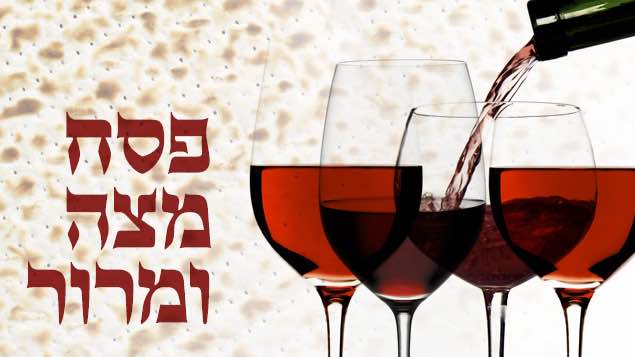
The Prophet Elijah & The Fifth Cup
There is always a fifth cup of wine on the Passover table from year to year. The fifth cup of wine is poured for the prophet Elijah. Taken from the clear biblical prophecy found in Malachi 4:5, it is the Jewish hope that God will soon send His prophet Elijah and provide the ultimate redemption for His people. The fifth cup of wine sits on the table at Passover, however, it is not drunk. The fifth cup is a continual reminder that we are still waiting for the ultimate redemption that God has promised through His Messiah and that the Messiah’s coming will be preceded by the prophet Elijah.
When Yeshua walked this earth 2000 years ago, He had a discussion about the prophet Elijah with His disciples after Elijah (along with Moses) had appeared with Him on the mountain. In this discussion with His disciples, Yeshua made it clear that Elijah had indeed already come through the one who was called John the Baptist:
As they were coming down from the mountain, Jesus commanded them, saying, “Tell the vision to no one until the Son of Man has risen from the dead.” And His disciples asked Him, “Why then do the scribes say that Elijah must come first?” And He answered and said, “Elijah is coming and will restore all things; but I say to you that Elijah already came, and they did not recognize him, but did to him whatever they wished. So also the Son of Man is going to suffer at their hands.” Then the disciples understood that He had spoken to them about John the Baptist. – Matt. 17:9-13
John the Baptist clearly came in the spirit and power of Elijah as he was sent ahead of the Messiah to prepare the way before Him (Matt. 3:1-3). Yeshua also referred in the above verses to a yet future coming of Elijah. We don’t know exactly how this will occur, however one thing is for sure, the Messiah has come and He will come again.
In contemplating the fifth cup of wine at Passover, I’m reminded that the Jewish tradition regarding the expectation of the Messiah and the ultimate redemption of mankind by the miraculous hand of God are biblical realities that each one of us should be anticipating. Yeshua Himself spoke these words to His disciples regarding His return and the end of the age:
There will be signs in sun and moon and stars, and on the earth dismay among nations, in perplexity at the roaring of the sea and the waves, men fainting from fear and the expectation of the things which are coming upon the world; for the powers of the heavens will be shaken. Then they will see the Son of Man coming in a cloud with power and great glory. But when these things begin to take place, straighten up and lift up your heads, because your redemption is drawing near. – Luke 21:25-28
As the signs continue to multiply on the earth, we can be certain of one thing; Yeshua will return and He will redeem all of those who are waiting for Him.
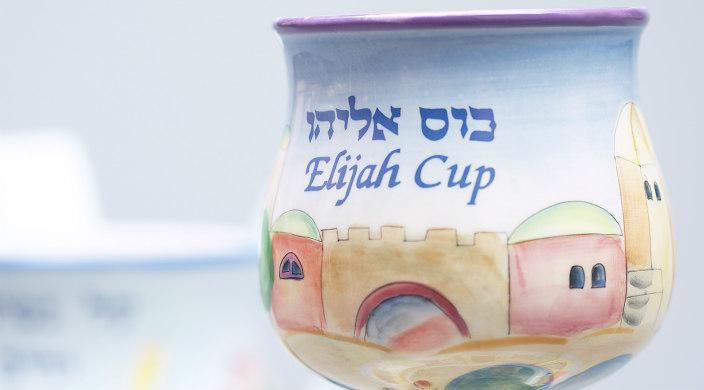
The Fifth Cup & The Final Redemption
The yearly celebration of Passover is a constant reminder of what God has done in the past by redeeming Israel out of the bondage of Egypt and by redeeming each one of us from our own personal bondage to sin by the power of the blood of the Lamb who came to this earth 2000 years ago. As the fifth cup of wine sits on the Passover table, let us remember that the Messiah is coming and that our redemption is drawing near.
Shabbat Shalom – We welcome your comments below!
If you enjoyed reading this article, share it today with friends! We also invite you to sign up for our weekly Torah Portion commentary on the sidebar to the right.
Help keep our weekly commentaries free and available to all. Click here to donate today:
Torah Portion: Lev. 6:8 – Lev. 8:36 (In Hebrew – Lev. 6:1 – Lev. 8:36)
Haftara for Shabbat HaGadol: Malachi 3:4 – Malachi 4:6 (In Hebrew – Malachi 3:4-24)
Return to Torah Portion Homepage
Copyright Jewels of Judaism. All rights reserved 2017

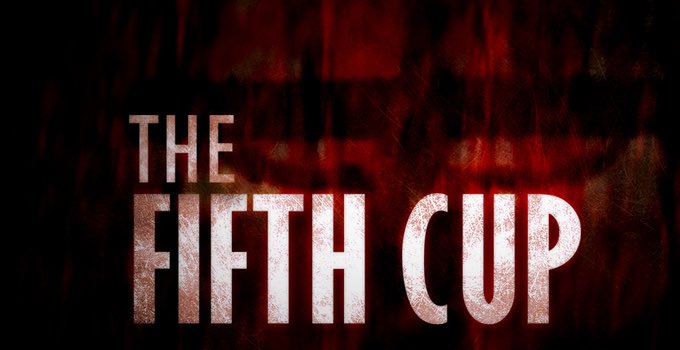

Thank you again Daniel. Geoff and I really enjoy your emails and I am sharing them with my two children. When you get a spare moment? would you be able to send me the email which talks about salt and the covenant made with our Lord. I had never heard about this explanation and my Pastor Bruce is very interested. When I went to send him the email I must have deleted it, although I can’t recall doing this. There is no hurry but I would love to share it with Bruce and his wife Maree. I am sure that if I feed them your emails their interest in Israel will grow in leaps and bounds. Bruce has not been a Pastor for very long, but it was quite miraculous that when we needed a Pastor for our little church, he was available and he took the job with us. Wonderful really. Take care dear Daniel. Much love in Jesus Rose and Geoff
Thanks Rose,
I’ve sent you you an email with the link for the Article on the Covenant of Salt.
Blessings,
Daniel